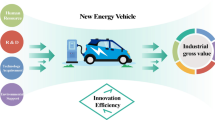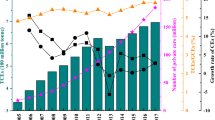Abstract
Implementing industrial policies to develop the new energy vehicle industry and improve technological innovation related to new energy vehicles is essential for countries dealing with environmental pollution and climate change. This paper first examines the impact of a demand-side industry policy related to new energy vehicles on the technological innovation level of supply-side vehicle enterprises. Regarding the new energy vehicle purchase tax exemption policy implemented by the Chinese government in 2014 as a quasi-experiment, this paper constructs a multi-period difference-in-differences (DID) model to identify the impact of the demand-side preferential tax policy on the technological innovation level of vehicle enterprises. In our DID design, 178 enterprises are in the treatment group and 166 enterprises in the control group, with 3,440 balanced panel data of observations. The results show that this policy can significantly promote the technological innovation of new energy vehicle enterprises. This promotion effect is greater in magnitude in large-scale enterprises, high-tech enterprises, and enterprises producing passenger vehicles. Theoretically, we believe that the demand-side tax exemption policy mainly indirectly promotes the technological innovation level of automobile enterprises through the signal channel and profit channel.

Similar content being viewed by others
Data availability
Data and materials are available on request from the authors.
References
Banerjee R, Maharaj R (2020) Heat, infant mortality, and adaptation: Evidence from India. J Dev Econ 143:102378
Bjerkan KY, Nørbech TE, Nordtømme ME (2016) Incentives for promoting Battery Electric Vehicle (BEV) adoption in Norway. Transp Res Part D: Transp Environ 43:169–180
Busom I, Corchuelo B, Martínez-Ros E (2015) Dynamics of firm participation in r&d tax credit and subsidy programs. Social Science Electronic Publishing
Carbon dioxide emissions data. (n.d.) Future think tank: https://www.vzkoo.com/, The World Bank: www.worldbank.org. Accessed 12 May 2021
China’s new energy vehicle technology innovation data. (n.d.) Baiten.cn patent database: https://www.baiten.cn/, China National Intellectual Property Office: https://www.cnipa.gov.cn/. Accessed 20 Mar 2022
Christiane M, Patrick P, Frances S, Till G (2019) How large is the effect of financial incentives on electric vehicle sales? ——A global review and European analysis. Energy Econ 84:104493
Clinton BC, Steinberg DC (2019) Providing the Spark: Impact of financial incentives on battery electric vehicle adoption. J Environ Econ Manag 98:102255
Coffman M, Bernstein P, Wee S (2017) Electric vehicles revisited: A review of factors that affect adoption. Transp Rev 37(01):79–93
Gao W, Hu XY (2019) Analysis of the impact of new energy vehicle subsidy policies on enterprise R&D investment under different market structures. Indust Technol Econ 38(12):127–136
Greenstone M, Gayer T (2009) Quasi-experimental and experimental approaches to environmental economics. J Environ Econ Manag 57(01):21–44
Hardman S, Chandan A, Tal G, Turrentine T (2017) The effectiveness of financial purchase incentives for battery electric vehicles——A review of the evidence. Renew Sust Energ Rev 80:1100–1111
Hong J, Koo Y, Jeong G, Lee J (2012) Ex-ante evaluation of profitability and government’s subsidy policy on vehicle-to-grid system. Energy Policy 42:95–104
Jenn A, Springel K, Gopal AR (2018) Effectiveness of electric vehicle incentives in the United States. Energy Policy 119:349–356
Jiang C, Zhang Y, Bu M, Liu W (2018) The effectiveness of government subsidies on manufacturing innovation: evidence from the new energy vehicle industry in China. Sustainability 10(6):1692–1703
Kester J, Noel L, Gerardo Z, Benjamin KS (2018) Policy mechanisms to accelerate electric vehicle adoption: A qualitative review from the Nordic region. Renew Sust Energ Rev 94:719–731
Kobayashi Y (2014) Effect of R&D tax credits for SMEs in Japan: A microeconometric analysis focused on liquidity constraints. Small Bus Econ 42(2):311–327
Langbroek J, Franklin J, Susilo Y (2016) The effect of policy incentives on electric vehicle adoption. Energy Policy 94:94–103
Lévay P, Drossinos Y, Thiel C (2017) The effect of fiscal incentives on market enetration of electric vehicles: A pairwise comparison of total cost of ownership. Energy Policy 105:524–533
Li WJ, Zheng MN (2016) Substantial innovation or strategic innovation?——The impact of macro-industrial policies on micro-enterprise innovation. Econ Res 51(04):60–73
Lin JD (2019) Analysis of the effect of financial subsidy on China’s new energy vehicle industry R&D activities. Mod Econ 10:96–107
Liu GQ (2016) Analysis of the incentive effect of tax incentives and fiscal subsidy policies——An empirical study based on the perspective of information asymmetry theory. Manage World 10:62–71
Liu XL, Xie FJ, Li YD (2020) Research on the evaluation of the new energy automobile industry cultivation policy system——based on Shanghai’s relevant data. Shanghai Econ Res 4:66–74
Ma S, Fan Y, Feng L (2017) An evaluation of government incentives for new energy vehicles in China focusing on vehicle purchasing restrictions. Energy Policy 110:609–618
Min HT, Cheng M (2007) Environmental impact and energy efficiency analysis of new energy vehicles. Tractors and Agricultural Transporters 04:105-106+108.
Palmer K, Tate J, Wadud Z, Nellthorp J (2018) Total cost of ownership and market share for hybrid and electric vehicles in the UK, US and Japan. Appl Energy 209:108–119
Production and sales data of new energy vehicles in China. (n.d.) National Development and Reform Commission: https://www.ndrc.gov.cn/. Accessed 27 Apr 2021
Qiu Y, Zhou P, Sun Y (2019) Assessing the effectiveness of city-level electric vehicle policies in China. Energy Policy 130:22–31
Sierzchula W, Bakker S, Maat K, Wee BV (2014) The influence of financial incentives and other socio-economic factors on electric vehicle adoption. Energy Policy 68:183–194
Snchez-Braza A, Cansino JM, Lerma E (2014) Main drivers for local tax incentives to promote electric vehicles: The Spanish case. Transp Policy 36:1–9
Wang W, Li HZ, Qiao PH, Gui JW (2017) Research on the impact of government subsidies on the performance of new energy automobile companies——based on in-depth analysis of corporate growth. Sci Technol Prog Countermeasures 23:114–120
Xiong YQ, Huang TT, Bruce L (2019) Regional differences in the implementation effects of new energy vehicle consumption promotion policies-acomparative perspective of “purchase“ and “use“ links. China Popul Resour Environ 29(05):71-78.
Xue CL, Zhou HG, Wu Q, Wu XY, Xu XB (2021) Impact of Incentive policies and other socio-economic factors on electric vehicle market share: a panel data analysis from the 20 countries. Sustainability 13:2928
Zhang JH, Li XQ, Fung HG, Qiao PH (2019) Do political connections promote innovation in environmentally polluting enterprises. China World Econ 27(3):76–101
Zhao Q, Li Z, Zhao Z, Ma JQ (2019) Industrial policy and innovation capability of strategic emerging industries: empirical evidence from Chinese new energy vehicle industry. Sustainability 11(10):2785
Zhou Y, Pan Y (2019) Financial subsidies and tax reductions——analysis of new energy automobile industry policy from the perspective of transaction costs. Manage World 35(10):133–149
Zuo Z, Wang T, Liu K (2015) Research on the purchase behavior of new energy vehicles and its environmental impact. Transportation Research 06:40-44+50.
Funding
The authors did not receive support from any organization for the submitted work.
Author information
Authors and Affiliations
Contributions
All authors contributed to the study’s conception and design. Material preparation, data collection and analysis were performed by Xing Zhang and Weibing Li. The first draft of the manuscript was written by Weibing Li. All authors commented on previous versions of the manuscript. All authors read and approved the final manuscript.
Corresponding author
Ethics declarations
Ethical approval
All procedures performed in studies involving human participants following the ethical standards of the institutional and/or national research committee and with the 1964 Helsinki declaration and its later amendments or comparable ethical standards. This article does not contain any studies with animals performed by any of the authors. Informed consent was obtained from all individual participants included in the study.
Financial interests
The authors declare they have no financial interests.
Consent to Participate
All authors agree to participate in our manuscript.
Consent to Publish
Our manuscript is approved by all authors for publication.
Additional information
Responsible Editor: Roula Inglesi-Lotz
Publisher’s Note
Springer Nature remains neutral with regard to jurisdictional claims in published maps and institutional affiliations.
Rights and permissions
Springer Nature or its licensor (e.g. a society or other partner) holds exclusive rights to this article under a publishing agreement with the author(s) or other rightsholder(s); author self-archiving of the accepted manuscript version of this article is solely governed by the terms of such publishing agreement and applicable law.
About this article
Cite this article
Li, W., Zhang, X. Can the Exemption of the New Energy Vehicle Purchase Tax Policy Induce Technological Innovation of Automobile Companies?. Environ Sci Pollut Res 30, 101669–101680 (2023). https://doi.org/10.1007/s11356-023-29489-3
Received:
Accepted:
Published:
Issue Date:
DOI: https://doi.org/10.1007/s11356-023-29489-3




